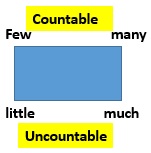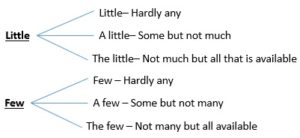Comparison of Adjectives List PDF – SSC, Bank, Railway
An Adjectives comes in three degrees – positive, comparative and superlative degree.
- Positive degree denotes the quality of a person, thing or group. It is used when no comparison is made. E.g. : He is a good boy.
- When two things or sets of things are compared, comparative degree is used. E.g.: He is better than you.
- Superlative degree is used to choose one out of a group or many. E.g.: He is the best student of my class.

Way to change Positive into Comparative and Superlative Degree
Rule 1
To change an adjective into comparative degree ‘er’ is added to the positive degree and ‘est‘ is added to change it into superlative degree.
| Positive | Comparative | Superlative |
| Bold | Bolder | Boldest |
| Deep | Deeper | Deepest |
| Higher | Higher | Highest |
| Strong | Stronger | Strongest |
| Thick | Thicker | Thickest |
| Weak | Weaker | Weakest |
Rule 2
If ‘e‘ is present at the end of a positive degree, ‘r‘ is added to change it into comparative degree and ‘st‘ to change it into superlative degree.
| Positive | Comparative | Superlative |
| Able | Abler | Ablest |
| Brave | Braver | Bravest |
| Fine | Finer | Finest |
| Noble | Nobler | Noblest |
| True | Truer | Truest |
| Wise | Wiser | Wisest |
Rule 3
If the positive degree ends in a consonant and a short vowel comes before it, the last consonant is doubled and then ‘er‘ and ‘est‘ are added to change it into comparative and superlative degree respectively.
| Positive | Comparative | Superlative |
| Big | Bigger | Biggest |
| Fit | Fitter | Fittest |
| Hot | Hotter | Hottest |
| Sad | Sadder | Saddest |
| Thin | Thinner | Thinnest |
| Wet | Wetter | Wettest |
Rule 4
When a positive degree ends in ‘y‘ and a consonant is present before ‘y‘, the ‘y’ is converted into ‘i‘, and then ‘er‘ and ‘est‘ are added respectively.
| Positive | Comparative | Superlative |
| Dry | Drier | Driest |
| Happy | Happier | Happiest |
| Heavy | Heavier | Haviest |
| Pretty | Prettier | Prettiest |
Note : If a vowel is present before ‘y‘, only ‘er‘ and ‘est‘ should be used.
| Positive | Comparative | Superlative |
| Grey | Greyer | Greyest |
Rule 5
Adjectives that are of more than two syllables, are changed to comparative and superlative degree by adding more and most respectively.
| Positive | Comparative | Superlative |
| Beautiful | more beautiful | most beautiful |
| Courageous | more courageous | most courageous |
| Intelligent | more intelligent | most intelligent |
| Pleasant | more pleasant | most pleasant |
Note : Certain adjectives do not follow any rule. They get changed completely.
| Positive | Comparative | Superlative |
| Good/well | better | best |
| Bad/ill | worse | worst |
| Little | less/lesser | least |
| Fore | former | foremost/ first |
| Late | later/latter | last/latest |
| Far | farther | farthest |
| Near | nearer | nearest/next |
| Old | older/elder | oldest/eldest |
| Much/many | more | most |
Note :
- Well & ill are adverbs.
- Less means ‘smaller in amount’ while lesser means ‘of less strength or importance’.
Correct Use of some adjectives
1. Use of ‘some‘ and ‘any‘ . Some/any means a little but the use is different.
2. Some is used in affirmative sentence before uncountable nouns to denote the quantity and it is used before plural countable nouns to denote number.
E.g.: I have some water. [Uncountable Noun (U.N)]
I have some friends. [Plural Countable Noun (P.C.N)]
3.‘Some‘ is generally used in positive sentences. ‘Any‘ is generally used in negative sentences and questions.
E.g.: I have some problems.
I do not have any problem
Do you have any problem?
When an answer is expected in ‘yes‘ , ‘some‘ is used in questions too.
E.g. : Do you have some water?
Note : ‘no any’ cannot be used together
4. Use of few, little, much and many


Fill in the blanks using few/little, a few/ a little or the few/ the little
- ____________ knowledge is a dangerous thing.
- The doctor advised him to rest for _____ days.
- _______ water I kept for you has been finished by him.
- The show was cancelled as ___ people turned up to see it.
- I cannot prepare tea for you. There is ____ milk in the refrigerator.
Answers
(1) A little (here the sentence means that incomplete knowledge is a dangerous thing. Here we mean that knowledge is available but not much.)
(2) A few (‘days’ is a countable noun, hence a few is used and not little. A doctor will advise us to rest for at least some days, hence ‘a few’ is appropriate.)
(3) The little (water is uncountable and here it means the small quantity of water that I had kept for you, hence ‘the little’ is appropriate.)
(4) Few (If very few people come, the show gets cancelled, hence ‘few’ is appropriate here which means ‘hardly any’.)
(5) Little (when milk is in negligible quantity, tea cannot be prepared).
=> Little & few cannot be used with quantity & number. Instead ‘small‘ is used with them.
E.g.: Little quantity of food was wasted. (×)
Small quantity of food was wasted. (✓)
Comparison of Adjective List pdf download
Candidates can download the pdf of comparison of Adjective List by clicking on below link.
Download Comparison of Adjective List PDF
All the best for your upcoming exam!
You can join or visit at Facebook Page or Twitter for always keep in touch with further updates.
Read more articles….
